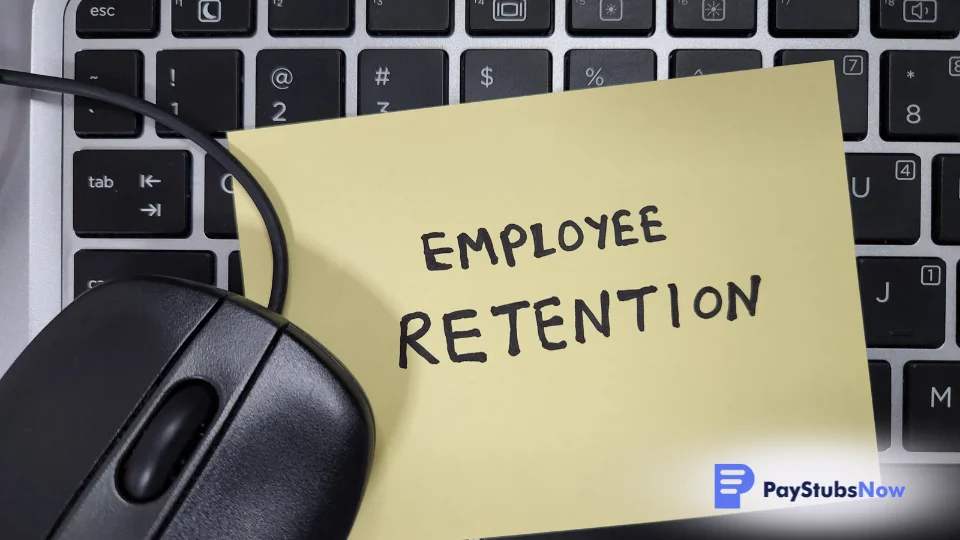What Is a Retention Bonus? How It Works & Key Benefits
One of the biggest challenges employers face in this job market is keeping employees from leaving for other opportunities. When it comes to retaining their best and brightest employees, the retention bonus can be a very effective tool for organizations. But what exactly is a retention bonus, and how does it work? Does it have any tax implications?
This article explores the concept of the retention bonus, exploring its functionality and the advantages it offers to employers seeking to maintain a strong and stable workforce. We'll also discuss the key components of these bonuses and highlight Paystubnow's platform as a valuable resource for companies to effortlessly generate financial documents that accurately reflect retention bonuses.
Main Takeaways of Retention Bonuses
- Retention bonuses are typically awarded during times of high employee demand, company restructuring, or when a specific employee is at risk of leaving.
- These bonuses offer many benefits for employers, including boosting retention rates, maintaining critical expertise, and providing a competitive advantage.
- Employees also appreciate retention bonuses, viewing them as recognition of their contributions and a commitment to their career development within the company.
- A clear and legally compliant retention bonus agreement is crucial for smooth implementation and employee understanding.
What Is a Retention Bonus?

A retention bonus, also referred to as a stay bonus, is a one-time payment offered to an employee as an incentive to remain with the company. Typically, retention bonuses are linked to a specific timeframe, requiring the employee to stay with the organization for a predetermined period (e.g., one year or two years) to receive the full bonus amount.
When Is a Retention Bonus Paid?
Companies may choose to offer retention bonuses in several situations:
- When skilled professionals are in high demand, retention bonuses can act as a financial incentive to make employees resist the lure of enticing offers from competitors.
- During periods of organizational change, such as mergers, acquisitions, or internal restructuring, retention bonuses can help encourage top-performing employees to stay put through the transition.
- If an employer identifies a valuable employee who may be considering leaving for another opportunity, an incentive bonus can make them stay.
The timing of a retention bonus payment can vary based on the terms set in the employment contract. Typically, these bonuses are paid at the end of the specified retention period.
In some cases, the payout could be structured in increments during the retention period or as a lump sum after a critical project milestone is achieved. The exact timing should be clearly outlined in the retention bonus agreement to prevent any misunderstandings.;
Benefits of Retention Bonuses for Employers

Implementing a retention bonus program has many benefits for employers who are looking to build a loyal and long-term workforce:;
Boost Retention
Employee retention bonuses can address the challenge of employee turnover. These supplemental wages encourage employees to remain with the company.
Companies have found retention bonuses to be an effective way to keep their skilled workforce intact. Some companies offer retention bonuses as a lump sum that is paid out upfront. Others set up a schedule where a certain amount is paid out per month or year.
Maintained Expertise
Experienced employees bring a wealth of institutional knowledge and expertise to a company. Retention bonuses help ensure their continued presence, preventing the loss of valuable skills and insights that would be costly and time-consuming to replace.
Continuity During Transitions
Periods of organizational change can be disruptive. Offering retention bonuses can incentivize key employees to stay on board during transitions, ensuring vital continuity and facilitating smoother implementation of new structures or processes.
Increased Employee Loyalty
A well-designed retention bonus program goes beyond financial reward. It expresses the company's recognition and appreciation for an employee's loyalty and contributions. This generates a sense of loyalty and strengthens the employee-employer relationship.
Improved Employee Motivation
When employees feel valued and appreciated, it can have a positive effect on their overall motivation. Receiving a retention bonus can make them feel like their contributions are recognized and encourage them to continue exceeding expectations.
Competitive Advantage
Retention bonuses can serve as a valuable differentiator in a competitive job market. Companies that demonstrate their commitment to their workforce through attractive compensation packages like retention bonuses are better positioned to attract and retain top talent.
Stronger Team Cohesion
In a time of organizational change, such as mergers, acquisitions, or internal restructuring, retention bonuses help maintain stability and encourage top-performing employees to stay with the company through the transition. When key employees remain on board, it creates a sense of stability and strengthens team cohesion.;
Attracts Top Talent
Retention bonuses aren't just about keeping existing talent. By demonstrating a commitment to employee value, companies can become more attractive to potential hires seeking an organization that prioritizes a long-term and rewarding work environment.
Supports Strategic Goals
Retaining key personnel who are familiar with company goals, initiatives, and strategies can significantly contribute to achieving overall business objectives. Retention bonuses can stabilize the workforce and ensure continuity toward achieving strategic goals.
Flexibility in Resource Allocation
By retaining skilled employees, companies can avoid the costs associated with recruiting, onboarding, and training new hires. This financial flexibility allows for more strategic resource allocation in the organization.
Key Benefits of Retention Bonuses for Employees

Beyond the advantages for the employer, retention bonuses hold significant value for employees as well:
Financial Incentives
This is the most obvious and immediate benefit. Retention bonuses provide employees with a tangible financial reward for their continued commitment to the company. This extra income can be used to address various personal and financial needs.
Job Security
While not a guarantee of permanent employment, retention bonuses can signal to employees that the company values their contributions and is committed to their long-term success. This can provide a sense of job security and reduce anxiety about potential job loss.
Recognition of Contributions
Retention bonuses are a powerful form of employee recognition. They acknowledge and appreciate the hard work, dedication, and valuable contributions of key employees. This recognition can boost morale and enhance employee engagement.
Career Stability
By incentivizing employees to stay, retention bonuses contribute to career stability. This allows employees to build on their existing contributions, develop deeper expertise within their roles, and potentially advance within the company.
Increased Motivation
Receiving a retention bonus can drastically boost employee motivation. It demonstrates the company's confidence in their abilities and encourages them to continue exceeding expectations. This increased motivation can lead to enhanced productivity and improved overall performance.
Long-Term Benefits
Retention bonuses can have long-term benefits for employees. By staying with the company, employees can benefit from opportunities for professional growth, career advancement, and increased earning potential over time.
Enhanced Employee Engagement
When employees feel valued and appreciated, they are more likely to be engaged in their work. Retention bonuses contribute greatly to building a positive and supportive work environment, boosting employee morale and engagement.
Retention Bonus as Perk
Retention bonuses provide a tangible reward that complements other benefits, such as health insurance, retirement plans, and paid time off. This type of compensation provides employees with a tangible incentive to remain employed for a certain amount of time, with the potential for bonus pay at the end of that time period.;
Professional Growth Opportunities
By staying with the company, employees have greater access to professional development opportunities, such as training programs, mentorship, and opportunities for advancement. This can contribute to their long-term career goals and personal growth.
Elements of a Retention Bonus Agreement

Let's explore the key elements of a well-structured retention bonus agreement.
Clear Terms
The agreement must clearly outline the eligibility criteria, the exact bonus amount, the payment schedule (lump sum payment or installments), and any performance expectations. Vague language can lead to disputes, so ensure all terms are clearly defined and easily understood by both parties.
- Clearly define which employees are eligible for the retention bonus package. This may be based on factors such as job title, performance level, or department.
- Specify the exact amount of the retention bonus. This could be a fixed amount or a percentage of the employee's salary.
- Determine the payment schedule for the bonus. Will it be paid in full upon meeting the retention period, or will it be paid in installments?
- If applicable, clearly outline any performance expectations that must be met to receive the full bonus.;
Duration
The agreement must clearly define the retention period. This is the specific timeframe the employee must remain employed with the company to receive the full bonus. Mention the start and end dates of the retention period. This helps avoid any confusion or disputes regarding the eligibility period.
Clawback Provisions
Clawback provisions are crucial clauses in retention bonus agreements that outline circumstances under which the employee must repay the bonus. These provisions protect the employer by ensuring bonuses are not granted if certain expectations/obligations are unmet.
Clearly outline the specific circumstances that could trigger a clawback of the bonus you provide. This may include voluntary resignation before the end of the retention period, termination for cause (e.g., misconduct, gross negligence), or failure to meet agreed-upon performance metrics. Define the bonus amount that may be subject to clawback in each scenario. This could be a partial or full clawback, depending on the severity of the triggering event.
Legal Compliance
Ensuring that retention bonus agreements are legally compliant is crucial for the effective management of these incentive schemes. This involves adhering to all relevant labor laws and tax regulations set by the Internal Revenue Service to prevent any potential legal issues.;
By establishing a legally sound framework, businesses can protect themselves from disputes and ensure fairness and transparency in the fulfillment of bonus agreements. Additionally, a well-drafted agreement can instill confidence in employees, contributing to a stronger sense of trust and stability within the organization.
Employee Understanding
The terms of the agreement must be communicated to the employee in a clear, concise, and easy-to-understand manner. Obtain written acknowledgment from the employee that they have received, reviewed, and understand all the terms of the retention bonus agreement. This helps prevent misunderstandings and potential disputes later on.
Simplify Employee Retention Pay With Paystubsnow
Payroll management can be a complex process, especially when it comes to dealing with unique compensation elements like retention bonuses. Paystubnow can be a valuable tool for businesses looking to streamline the management of employee retention pay. Here's how:
- Accurate and Efficient Paystub Generation: Our platform allows you to easily generate paystubs that accurately reflect the retention bonus alongside regular wages and deductions. This ensures transparency for the employee and simplifies record-keeping for the company.
- Compliance With Tax Regulations: Paystubnow ensures proper tax calculations are applied to the retention bonus, factoring in federal, state, and local tax withholding requirements. This reduces the risk of errors and ensures accurate tax reporting.
- Streamlined Workflow: Paystubnow helps streamline the process of generating paystubs. This promotes efficiency and saves valuable time for HR and accounting teams.
With Paystubnow, companies can simplify the management of employee pay, ensuring the accuracy of all components and the maintenance of compliance and overall efficiency in the payroll process.

